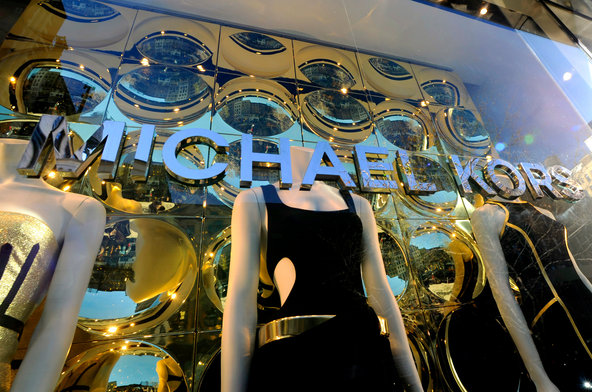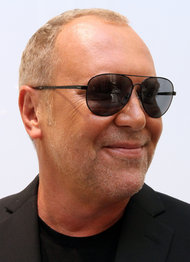 Peter Foley/Bloomberg NewsA Michael Kors store on Madison Avenue in New York.
Peter Foley/Bloomberg NewsA Michael Kors store on Madison Avenue in New York. Tina Fineberg/Associated PressMichael Kors, who started his business in 1981, has developed a loyal following, including Michelle Obama and Angelina Jolie.
Tina Fineberg/Associated PressMichael Kors, who started his business in 1981, has developed a loyal following, including Michelle Obama and Angelina Jolie.
8:29 p.m. | Updated
Michael Kors seems to be everywhere. The fashion designer’s stores are popping up across the world, with his largest just opening in Paris. His oversize gold watches are white-hot Christmas gifts. As a judge on Lifetime’s “Project Runway,” Mr. Kors is also a staple on cable television.
His latest debut is less haute couture and more high finance.
On Wednesday, his Hong Kong-based company, where Mr. Kors is the chief creative officer, priced its initial public offering at $20, above the expected range of $17 to $19. The stock sale, which raised nearly $950 million, values the company at $3.8 billion.
The I.P.O. caps a period of extraordinary growth for the company. Profits are on track to more than double this year, and sales are increasing at an annual rate of about 60 percent.
Such rapid expansion has raised the eyebrows of retail analysts, who question whether the Kors label will maintain its cachet or succumb to the fickleness of fashion.
“Everybody wants to be the next Ralph Lauren,” said Faye Landes, a retail analyst at Consumer Edge Research in Stamford, Conn. “But how lasting the brand will be remains an open question.”
Kors is also selling its shares into a choppy market. Investors have shied away from unproven companies, amid concerns over the European debt crisis and the sluggish United States economy. Stock of several hot debuts, like the Internet companies Groupon and Pandora, have dropped below their offering prices.
Newly public fashion stocks have been soft, too. Prada, the Italian luxury retailer, is down since its debut, while a rival, Ferragamo, is flat.
Analysts are worried that Kors could suffer too, especially with the insiders paring back their holdings through the I.P.O. and an earlier private sale of shares. The stock is set to start trading Thursday on the New York Stock Exchange under the ticker KORS.
For now, it appears Kors stock is as hot as its dresses. Orders for the I.P.O. greatly exceeded the amount of shares sold, people briefed on the deal said, driving up the price of the offering.
“In the early days of trading, the hot money drives the performance of Michael Kors, the stock,” said John E. Fitzgibbon Jr., publisher of IPOscoop.com. “But over time, as that moves out, investors will start to focus on Michael Kors, the company.”
Michael Kors, the person, was born Karl Anderson Jr. He changed his first name and borrowed the last name, Kors, from his mother’s second husband, Bill Kors, who had adopted him. He grew up in Merrick, N.Y., which he has called the home of “Olympic shoppers” and credits with fostering his fashion sense.
Mr. Kors, a Fashion Institute of Technology dropout, designed a collection for Lothar’s, the Manhattan boutique, now defunct. He started his own business in 1981, creating designer apparel that developed a cult following among the Upper East Side crowd. Today, trendsetters like Michelle Obama and Angelina Jolie favor his frocks.
But most of the company’s recent growth has come from its lower-end Michael by Michael Kors line, which sells sequined wrap dresses for $150 and python-embossed shoulder bags for $228. The cheaper clothes and purses, which a Kors executive described to potential investors last week as “Hermès for Staten Island,” are big sellers at Macy’s and Lord Taylor.
Or, as Mr. Kors put it in an interview with Women’s Wear Daily, “It doesn’t matter what your pocketbook is, everyone wants to look thin and rich.”
While not affecting Mr. Kors’s waistline, the I.P.O. will make him rich. Mr. Kors, 52, the company’s honorary chairman and chief creative officer, is selling stock worth about $117 million, or roughly a third of his holdings. He maintains an 8.6 percent ownership stake, worth about $327 million at the offering price.
The I.P.O. adds to a year of personal milestones for Mr. Kors. In August, he and his boyfriend, Lance LePere, married in a barefoot ceremony on Dune Beach in Southampton. They met two decades ago when Mr. LePere worked as an intern at Michael Kors. Today, Mr. LePere is the creative director of the company’s women’s line.
Kors stock, in many ways, is not a bet on Mr. Kors, but on Lawrence S. Stroll and Silas K. F. Chou, the fashion tycoons who control the majority of the company’s stock and have fueled its growth. Mr. Stroll and Mr. Chou run Sportswear Holdings Limited, which acquired Kors in 2003 for about $100 million. Their ambitions were to bring the luxury sensibility of Mr. Kors to the masses and turn it into the next great American designer firm.
They sought to replicate their success with the Tommy Hilfiger Corporation. Mr. Stroll and Mr. Chou were early Tommy Hilfiger investors in the late 1980s and aggressively expanded that business, pushing it into department stores and broadening its customer base. The two men made millions when the company went public in 1992. (Today, Tommy Hilfiger is owned by the apparel giant PVH Corporation.)
Retail analysts say that while Mr. Stroll and Mr. Chou have a record of success, they have also had some stumbles, including their failed investment in Asprey, the London luxury brand.
They also point to some specific concerns with the Kors deal. Because the company is based in Hong Kong and Mr. Stroll and Mr. Chou control the majority of its stock, Kors does not have to comply with certain New York Stock Exchange corporate governance requirements. For instance, the company will not be required to have a majority of independent board members.
The I.P.O. does not include Kors’s Chinese business, which is a separate entity and remains controlled by Mr. Stroll, Mr. Chou and Mr. Kors. That means that the company, at least for now, will not benefit from the tremendous growth that other luxury retailers have seen in China.
Another red flag is the large amount of stock being sold by the owners. Besides Mr. Kors’s stake, the holding company of Mr. Stroll and Mr. Chou is selling $519 million worth of stock. After the I.P.O., they will own 35 percent of the company, worth $1.4 billion.
It is the second time this year the owners have cut their holdings. This summer, they sold $500 million worth of shares in a private sale to mutual fund firms like Fidelity and T. Rowe Price.
“There are aspects of this deal that are opaque,” said Ms. Landes, the analyst. “Plus, the fact that the insiders are selling so much stock is a potential cause for concern.”
This post has been revised to reflect the following correction:
Correction: December 14, 2011
An earlier version of this article misstated the network currently showing “Project Runway,” the cable television series on which Michael Kors is a judge. It is now shown on Lifetime; it was previously shown on Bravo.
Article source: http://feeds.nytimes.com/click.phdo?i=d76adff4e84afca7a5553371bd21c5b7